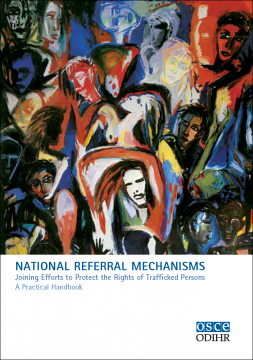This handbook provides guidance on how to design and implement sustainable mechanisms and structures to combat human trafficking and support victims. It also provides guidance on how to monitor and build the capacity of such mechanisms and structures.
The implementation of a comprehensive rights-based anti-trafficking policy should be seen as an element of democratic and transparent governance based on the rule of law. Thus, a crucial prerequisite of effective measures is the building and strengthening of relevant local and national institutions. This handbook provides guidance on how to design and implement sustainable mechanisms and structures to combat human trafficking and support victims. It also provides guidance on how to monitor and build the capacity of such mechanisms and structures.
The Handbook is also available in other languages here.

